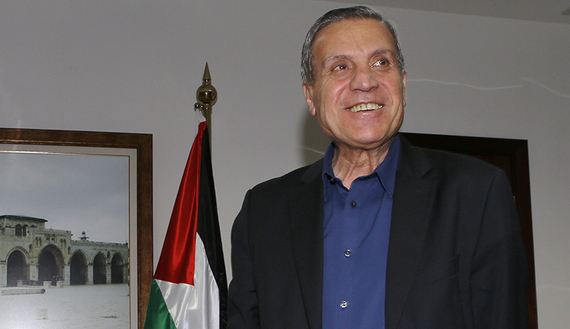The appointment of Nabil Abu Rudeineh in a unanimous vote June 19 as a member of the ruling Fatah Central Committee is the latest sign of the unique relationship between Fatah and Palestinian Christians. Abu Rudeineh, a Christian Palestinian from Bethlehem, has been the official spokesman for the Palestinian presidency since the days of President Yasser Arafat.
Afif Safieh, a member of the Fatah Revolutionary Council since 2009 and a former ambassador to Moscow, London, Washington and the Holy See, told Al-Monitor that President Mahmoud Abbas has followed in the steps of Arafat on this issue. “Since the days of Arafat, the Fatah movement was always keen to ensure a significant and visible Christian Palestinian participation in all levels of society.”
Safieh, a Palestinian Christian from Jerusalem, was very supportive of the decision. “It was an obvious choice and I fully endorse it,” he said. Safieh noted that there were always at least two Christians in the Executive Committee of the PLO, always at least two Christians in all the successive Palestinian governments and a minimum quota representation in the Palestinian Legislative Council (PLC).
An elected member of the Revolutionary Council since 2009, Safieh said that Fatah congresses elected four and five Christian members respectively for the movement’s Revolutionary Council in 2009 and 2016, while 10% of ambassadors are Christians — Arafat took the bold decision that all cities and villages that had a Christian significance presence will have a Christian mayor in spite of the demographic changes that have occurred in recent decades.
Rateb Y. Rabie, chairman of the US-based Holy Land Christian Ecumenical Foundation, told Al-Monitor that Fatah appreciates the leadership of Palestinian Christians and their loyalty to the party. “But outside the party, they see them just as good citizens within the larger national community,” he added.
Rabie called on Fatah and the PLO to look at the big picture so as to recognize the influence, power potential and resources they can tap into within the Christian community in Palestine and in the diaspora. “Palestinian Christians can certainly assist the national interest and advance the common good of the Palestinian people,” he argued.
Hanna Issa, the secretary-general of the Islamic-Christian Council for Jerusalem and the Holy Places, was full of praise to Abu Rudeineh. “He is a giant figure with clean hands, a quiet personality and a moderate political position that is accepted by all,” Issa told Al-Monitor, adding that Abu Rudeineh has worked with the late Fatah leaders Khalil al-Wazir (Abu Jihad) and Salah Khalaf (Abu Iyad), as well as presidents Arafat and Abbas.
Bernard Sabella, an elected member of the PLC on the Fatah list representing Jerusalem’s Christians, told Al-Monitor that Abu Rudeineh’s personality fits the profile of the leading Fatah movement. Sabella said that what makes it easy for Palestinian Christians to be active with Fatah is its ideological disposition. “Fatah is ideologically secular and pragmatic, and this goes very well with the Palestinian Christian community.”
A senior PLO source told Al-Monitor on condition of anonymity that Abu Rudeineh was asked not to run for a directly contested position on the Central Committee in the seventh Fatah congress that took place in Ramallah in December 2016. Issa, however, said he would have preferred for Abu Rudeineh to have been directly elected rather than appointed to the highest Fatah body. Fatah bylaws allow the appointment of three additional members of the movement at large with two-thirds of the votes of the Central Committee.
Mohammed Daraghmeh, a senior reporter for the Associated Press covering the Palestinian leadership, told Al-Monitor that the appointment of Abu Rudeineh is very much a part of the culture established by Arafat. “Arafat was keen to show the world the diversity of the Palestinian people, and so he established quotas for Palestinian Christians in the top legislative and executive bodies, as well as in towns that had a Palestinian Christian majority such as Bethlehem, Beit Sahour, Beit Jala, Ramallah and Birzeit,” he explained.
The number of Palestinian Christians still living in Palestine is very small. It is estimated that they don’t make up more than 2% of the population of the West Bank and Gaza Strip, while there are said to be 1 million Palestinian Christians worldwide representing more than 10% of the overall population of Palestinians.
Safieh named various other nonpolitical contributions of Palestinian Christians as well. “Palestinian society is aware of Christian contributions in education [universities and schools] and medication [hospitals and clinics], and also in the arts, music, theater and filmmaking,” he said.
By creating a quota system, the Palestinian leadership has gone out of its way to ensure that Christians are represented in all levels of Palestinian leadership positions despite their dwindling numbers. The challenge remains on how to ensure that what many call the living stones of Palestine are allowed to play a much bigger role in bridging the gap between Palestine and the world.
Source: Al-Monitor.com






